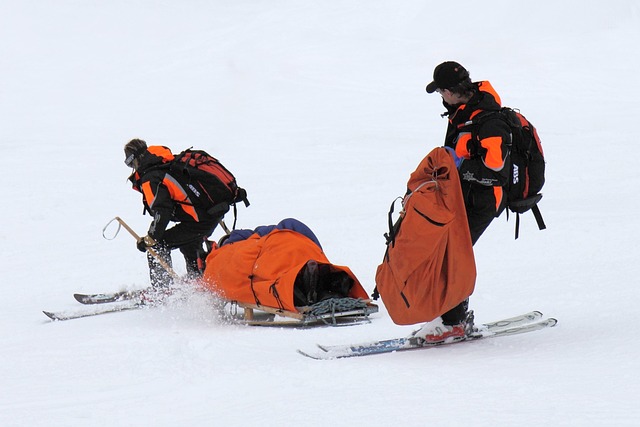To ski enthusiasts, the expression “hitting the slopes” conjures up images of gliding down snowy runs in vertical position, and arriving at the bottom of the hill only to take the ski lift up, and repeat the process again.
But in its more literal sense, hitting the slopes means just that: you fall down on the ski slope and sustain more or less serious injuries.
And to use another skiing metaphor, once you have an accident, it will be all uphill from there.
Whether you are going to the mountains for a day or a longer vacation, it is wise to consider what kind of insurance policies you may need, just in case.
Even the most skilled skiers / snowboarders / snow shoers are not immune to occasional accidents.
As a matter of fact, about 50,000 accidents are recorded in the Swiss Alps each winter, “the vast majority of which are linked to skiing and snowboarding, the two disciplines that also generate the highest costs”, according to Swiss National Accident Insurance Fund (SUVA).
That’s why accident insurance is a must
If you live permanently in Switzerland, regardless of whether you are a Swiss national or a foreigner, you already have an accident insurance — either through your employer if you work more than eight hours a week, or through your own policy if you are self-employed.
In some cases, accidents are covered under your compulsory health insurance (KVG / LaMal); this applies particularly to stay-at-home partners, children, students, and retirees.
The insurance will cover most of the accident-related costs, including those of rescues by helicopters, though some policies will cover more or less of the expenses incurred.

These rescues are very expensive, so if you want to be fully covered for such cases, consider buying a supplemental insurance that includes some coverage for search and rescue costs, medical transportation, and repatriation (if you ski abroad).
Many (but not all) Swiss supplemental health insurance plans include unlimited coverage for ambulance transportation and repatriation to Switzerland for medical care.
READ MORE : Why getting rescued in the Swiss Alps could cost you thousands
What if you are a foreign tourist who has an accident on Swiss slopes?
The rule here is the same as for any medical emergency that can befall a foreign national in Switzerland.
“Nationals of other countries must have sufficient insurance to cover the costs of treatment in Switzerland,” according to the Federal Office of Public Health (FOPH).
If you are from an EU / EFTA state and have the European Health Insurance Card (EHIC), “you are entitled to receive medical care that is considered essential, given the type of treatment and the expected length of stay in Switzerland”, FOPH said.
“Essential care” means vital emergencies, rather than non-urgent treatments that can be safely postponed until you return home.
If you have an accident while skiing, the gravity of your injuries will determine whether they are “vitally urgent” or not.
Tourists from third nations, on the other hand, must have an adequate health insurance policy covering the costs of essential medical treatment due to illness of accidents.
READ MORE: Can a Swiss hospital refuse urgent medical care to a foreigner?

Accidents are obviously the most common occurrences on the slopes, but you may need other types of insurance as well.
For instance:
Personal liability insurance (Haftpflichtversicherung / responsabilité civile / la responsabilità civile)
This kind of policy would kick in if you or a family member cause an accident, injuring, even if inadvertently, another person.
Your liability insurance would pay the costs generated by this person’s accident — perhaps not medical ones if he or she has their own insurance (as mentioned above), but that of other damages, like broken skis and other equipment that got destroyed in the process.
Unlike KVG / LaMal and accident insurance, liability coverage is not compulsory, but it is very useful to have. It can be purchased from nearly every insurance carrier in the country.
READ MORE : What is Swiss liability insurance and do you need it?
Travel insurance
This too is optional but useful to have, especially with the option for cancellations of trips in cases of extraordinary circumstances (see below).
If you reserved the hotel, bought ski passes (and, if you come from abroad, booked a flight), and then extreme circumstances prevent you from making the trip, at least you will be able to get your money back.
What constitutes such events?
Illnesses and other health emergencies, death in the family, or loss of job.
Most policies will refund the money you spent but you will need to provide documentation such as medical certificates or other proof of one of the above emergencies.
This policy can also be purchased from insurance carriers or organisations like Touring Club Suisse (TCS).
Sports equipment insurance
This coverage is not as well-known as the previous ones, but it can prove useful if your skis, snowboards, and all the other winter-sports equipment breaks or is stolen.
Again, you can purchase this policy from an insurance company.



 Please whitelist us to continue reading.
Please whitelist us to continue reading.
Which mountain/heli rescue membership/insurance provides the best coverage for non-Swiss traveling to Switzerland. Are the mountain rescue memberships (Rega, Air Zermatt, etc) strictly regional and only effective if you are skiing/climbing in their coverage area?